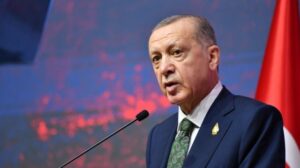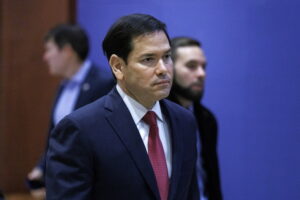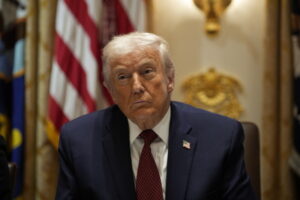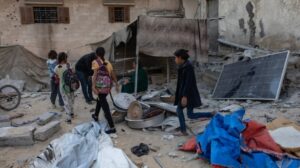As the Turkish parliament resumed its sessions after the summer holidays, Devlet Bahçeli, head of the ultra-nationalist MHP party, made a surprising move by approaching his Kurdish DEM politicians to shake their hands. The reason the move caused a sensation is that for years Bahçeli has argued that the leftist pro-Kurdish DEM is linked to the PKK terrorist organization and should be banned.
Even more surprising, however, was Bahçeli’s statement a few weeks later that PKK leader Abdullah Ocalan could hope to be released from prison under certain conditions as long as he announced in parliament the dissolution of the PKK. Ocalan was allowed to see his family for the first time in 43 months, with the PKK leader sending the message that he is willing to resolve the Kurdish issue through political and legal channels. From 1999 to the present, the 76-year-old has been held in solitary confinement in a maximum security prison.
Following Erdoğan’s decision in 2015 to end efforts to peacefully resolve the differences between the Turkish state and the PKK, the conflict has come to a head, with the government cracking down on and targeting elected Kurdish politicians, as well as conducting military operations in northern Iraq and northeastern Syria aimed at striking the Kurds and the PKK.
With the carrot and the stick
After recent statements by Bahçeli, however, many are wondering about Ankara’s plans. Why is it that on the one hand, a rapprochement with the Kurds seems to be sought, but on the other hand elected Kurdish mayors are persecuted?
Two weeks ago, the mayor of Esenyurt, a municipality in Istanbul, was arrested on charges of having links with the PKK. The politician was a joint candidate of the opposition CHP and DEM. A few days later, three other mayors in the southeast of the country were ousted.
Some believe the government tried to negotiate secretly with Ocalan and because the negotiations did not go as hoped, it is now moving vindictively against Kurdish politicians.
Observers are certain that Erdogan wants to be re-elected president once again. But for him to be able to run for a fourth term, the constitution would have to be revised, and he currently lacks the necessary majority in parliament to do so. He is therefore trying to put pressure on the Kurds and the pro-Kurdish DEM with carrot-and-stick tactics. In this way, he could further succeed in splitting the opposition.
According to political scientist Arzu Yilmaz, other reasons play a decisive role in Ankara’s moves such as “instability in the Middle East and the US administration’s decision to withdraw its troops from Iraq and Syria by 2026.” After Donald Trump’s re-election, this could even happen sooner, according to the expert. “In the Middle East, the balance of power is shifting and despite its ambitions, Turkey does not have a decisive role in developments.” Currently, the US has 2,500 troops in Iraq and 900 in Syria, where it is working closely with Kurdish militias.
The narrative of an Israeli attack on Turkey
Erdogan himself has implicitly acknowledged that the conflict in the Middle East is a cause for grave concern. The Turkish president has also claimed that after Gaza and Lebanon, Israel will attack Türkiye stressing that there must be a strong rally against foreign powers threatening the country.
According to Yilmaz, this is how Erdogan seeks to manipulate Turkish public opinion. The expert believes that Erdogan is particularly concerned that the conflict in the Middle East could also change the status quo of the Kurds. Israel could, for example, try to create a neutral zone on the Jordan-Iraq border to limit Iran’s influence in Syria – and such a development would be an obstacle to Erdogan’s plans to bring certain areas of Syria under Ankara’s control. That is why, and always according to Yilmaz, the Turkish president is seeking closer cooperation with the Kurds.
Yilmaz’s assessment seems to be shared by Beshe Hozat, co-chair of the KCK, an umbrella organization of the PKK. In a recent interview, Hozat said that Turkey’s geopolitical and geostrategic position and influence in the region are being drastically weakened. This is causing panic in the Turkish government, which in response is seeking to instrumentalize Ocalan.
Are new military operations just around the corner?
On Sunday, Erdogan announced that he would soon close the security gaps on the country’s southern border, and this means nothing other than that Türkiye is preparing for new military operations in Syria and Iraq.
According to Yilmaz, Iraqi Kurds do not need to worry about their future since their status quo is founded on the country’s constitution. What is uncertain, however, is the future of Rojava. The autonomous region of northeastern Syria has so far been supported by the United States. But when US troops withdraw, a power vacuum will be created, and it is unknown how it will be filled. The Kurdish regions could become a battleground for conflict between the powerful regional powers. How the Kurds cooperate will then be crucial, according to Yilmaz. “This will determine whether the Kurds will emerge at the end of this crisis stronger or weaker.”
PKK sources said that a first meeting of Kurdish parties from Iraq, Iran, Syria, and Türkiye took place in Brussels last week on the situation in the Middle East and Ankara’s moves. However, there is no information on the results of the meeting.
Ask me anything
Explore related questions





